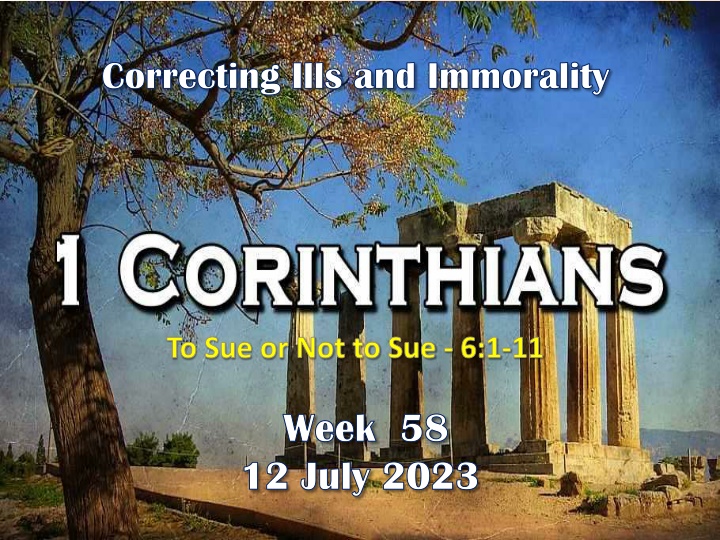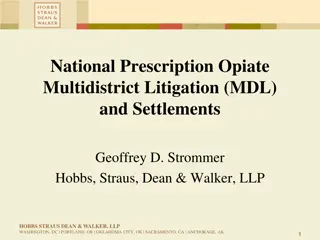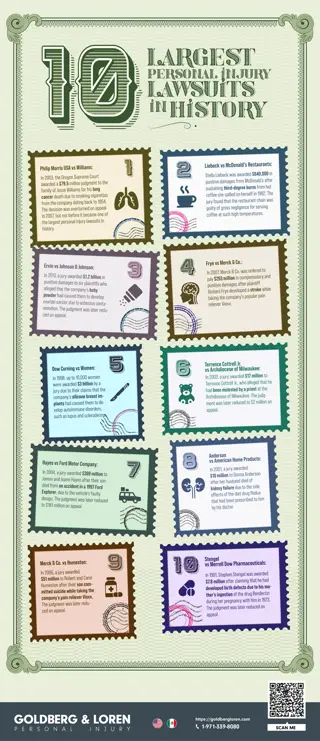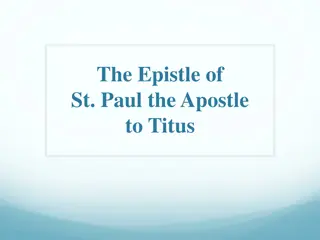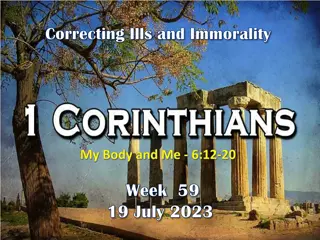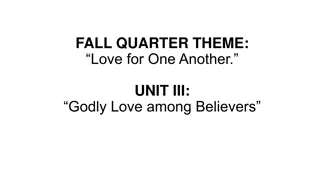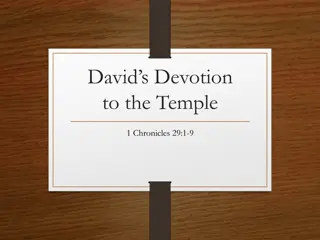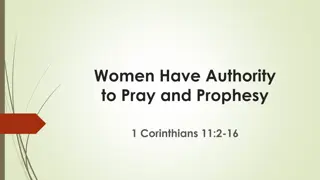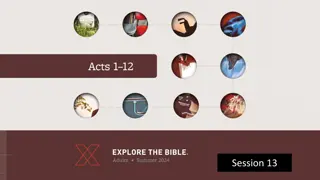Addressing Lawsuits Among Believers in Corinth
As we delve into First Corinthians, we encounter Paul's teachings on Christian conduct, church discipline, and spiritual growth. The issue of lawsuits among Christians in Corinth is highlighted, with Paul urging them to resolve conflicts within the community rather than seeking legal recourse outside. This lesson on handling disputes within the church community is relevant both historically and in contemporary times, offering insights on prioritizing harmony and unity among believers.
Download Presentation

Please find below an Image/Link to download the presentation.
The content on the website is provided AS IS for your information and personal use only. It may not be sold, licensed, or shared on other websites without obtaining consent from the author.If you encounter any issues during the download, it is possible that the publisher has removed the file from their server.
You are allowed to download the files provided on this website for personal or commercial use, subject to the condition that they are used lawfully. All files are the property of their respective owners.
The content on the website is provided AS IS for your information and personal use only. It may not be sold, licensed, or shared on other websites without obtaining consent from the author.
E N D
Presentation Transcript
Correcting Ills and Immorality Correcting Ills and Immorality To Sue or Not to Sue - 6:1-11 Week Week 58 12 July 12 July 2023 58 2023
1 CORINTHIANS INTRODUCTION As we continue our study in First Corinthians, we are reminded that the themes of this letter revolves around Christian Conduct in the local church and how it influences unity,discipline, andspiritual growth.. worldliness. Paul s main objective in this letter is to make Positional sanctification Progressive. Therefore the corrective here is behavior rather than doctrine. The major problem in the church at Corinth was In this Third section (4:1-6:20). Paul outlines the principles and process of church discipline needed to purge and purify the church of its Immaturity and Immorality.
1 CORINTHIANS - LESSON OVERVIEW Swindoll opens this study by giving us some insight into the tactics of Lawyers. Saying If they aren t luring us in with billboards, they are enticing us on television. If they are not combing police reports for accident victims to solicit, they are mailing color pamphlets to our homes, trying to stir up interest in their services. Admittedly, there are times we need Lawyer, these trained, skilled, and experienced professional to help us work through complicated contracts, business ventures, or serious cases in which our rights have been violated. However, it seem like our lawsuit-crazed world has turned the legal profession into a market-driven industry.
1 CORINTHIANS - LESSON OVERVIEW What we see today is nothing new. In the Greco-Roman culture that enveloped the Corinthian church, lawsuits abounded. Sadly, as we have seen, the Christians in Corinth had been slow to abandon many of the vices of the secular culture; the rage over civil litigation was no exception. In 6:1-11, Paul identifies a major problem plaguing the church: Lawsuits among the brethren. He exposes the source and offers a solution fit not only for first-century believers, but also for Christians in our generation.
1 CORINTHIANS 6:1 1Dare any of you, having a matter against another, go to law before the unrighteous, and not before the saints?
1 CORINTHIANS 6:1 In ancient Greece, home of the world s first democracy, the courts bustled with activity. Barclay says The Greeks were characteristically a litigious people. The law courts were one of their chief entertainments. In a Greek city every man was more or less a lawyer and spent a great deal of his time either deciding or listening to law cases. The Greek city of Athens was especially notorious for its fondness of litigation and because lawsuits were not often won by those who presented the best evidence, but by the most persuasive argument, those with great oratorical skills were highly esteemed.
1 CORINTHIANS 6:1 Corinth, with its metropolitan atmosphere, international trade centers, and close proximity to Athens the lawsuit capital of Greece couldn t help but become polluted by the lawsuit mania. Roman society was notoriously litigious, and Corinth, with its rising class of nouveau riche, was no exception. While many of the lawsuits addressed property matters among the wealthy, some grievances were simply pretexts for avenging insults and pursuing enmity. Now, combine the Corinthian Christians keenness for rhetorical skill with their adoption of the culture s fascination with litigation, and the sad result of believers suing other believers in civil court was bound to infect the church.
1 CORINTHIANS 6:1 Like the pagan around them, the Corinthian Christians took their interpersonal disputes with other believers to the civil courts, where unbelievers judged their cases according to Roman law. Whether it related to family matters, property, inheritance, breach of contract, or slander, these civil suits had become common enough that Paul had heard about them and saw the need to address the problem. Paul s statement in 6:1 drips with disbelief and disdain. It was more of a jab than a gentle inquiry, Paul already knew that some had taken their cases before unbeliever, yet he was still stunned by the audacity of his children in the faith.
1 CORINTHIANS 6:1 Paul s passionate reaction to the situation in Corinth is punctuated all the more, when we recall that in the previous chapter Paul had to chastise the church for failing to deal with the immoral sexual sin in their midst. Not only did they not judge those who needed to be judged for the sake of the purity of the church, but when they did judge, they turned to unregenerate judges, further compromising the purity of their witness.
1 CORINTHIANS 6:2-3 2Do you not know that the saints will judge the world? And if the world will be judged by you, are you unworthy to judge the smallest matters? 3 Do you not know that we shall judge angels? How much more, things that pertain to this life?
1 CORINTHIANS 6:2-3 So, after catching the attention of the perpetrators, Paul develops his argument based on solid theological foundations: Christian identity and destiny. Paul begins by reminding them of who they are in Christ based on the promises of what they will become: judges not only of the world (6:2) but also of the angelic beings (6:3). He reminds them that one day, after the resurrection from the dead, the saints will reign with Christ as judges over both the spiritual and the earthly realms (Jude 1:14-15; Rev 2:26- 27). Based on this theological truth, Paul argues from the greater to the lesser.
1 CORINTHIANS 6:2-3 Saying Since one day the saints will be entrusted with judging the weightiest matters of the future world, why are they having such trouble arbitrating the smallest issues of the present world (6:2-3)? Paul s language denoting lawsuits appropriate for the smallest courts, likely refers to trivial matters that never should have achieved such fury. This reference indicates that Paul is specifically referring to civil lawsuits as opposed to criminal cases, because he teaches elsewhere that criminal cases must be handled by the state (Romans 13:3-4). Here Paul does not attack human government as the God-ordained institution empowered to promote law and justice in the world.
1 CORINTHIANS 6:2-3 In fact, Christians have always regarded criminal cases to be under the legitimate jurisdiction of the state. Paul s condemnation specifically applies to voluntary civil suits filed by individual believers against other individual believers. Paul s point is that the matters under consideration were so minor that they didn t require the attention of legal experts. Once the believers really understood their position in Christ and embraced biblical principles, they had all the essentials necessary to arbitrate their own disputes among church members. They needed only to apply them.
1 CORINTHIANS 6:4-6 4If then you have judgments concerning things pertaining to this life, do you appoint those who are least esteemed by the church to judge? 5I say this to your shame. Is it so, that there is not a wise man among you, not even one, who will be able to judge between his brethren? 6But brother goes to law against brother, and that before unbelievers!
1 CORINTHIANS 6:4-6 So, without putting down the wisdom and authority of the civil magistrates, Paul puts the idea of the unregenerate judge in its proper place. Implying, that the values and virtues of the Christian faith, sourced in love and centered on grace, do not match the values and virtues of the civil courts justice that follows the letter of the law. Meaning, that the difference between secular courts and sacred counsel is the difference between law and grace. The unbelieving legal experts don t understand the Christian life.
1 CORINTHIANS 6:4-6 They don t understand what it means to walk in the Spirit, to look at things from God s perspective, to weigh the temporal against the eternal, and to look out not only for own interests, but also for the interest of others. We have learned that for the lost man, such spiritual things are foolishness (2:14). The opinions of such a judge should have no account in the church (6:4), which is governed by the law of Christ operating in unconditional love among the brethren. From a mature, spiritually-minded Christian perspective, asking a worldly-minded non-Christian to settle disputes among believers living according to Christ s mandates is like entering a writing contest with judges who can t read. It s shameful! (6:5).
1 CORINTHIANS 6:4-6 Paul marvels that the Corinthians can t seem to find even one wise man among them qualified to arbitrate disputes among believers in the church (6:5). Paul s point is particularly stinging when we recall that, in the beginning, the Corinthians were pride of their so- called wisdom. However, based on the fact that a brother goes to the law against a brother before unbelieving judges (6:6), an outside-observer might logically infer, that the wisest of the Corinthian leaders were fools who couldn t handle even simple worldly matters.
1 CORINTHIANS 6:7-8 7Now therefore, it is already an utter failure for you that you go to law against one another. Why do you not rather accept wrong? Why do you not rather let yourselves be cheated? 8No, you yourselves do wrong and cheat, and you do these things to your brethren!
1 CORINTHIANS 6:7-8 In any lawsuit the goal is to win big. Nobody files a case with the courts if they expect to lose. Yet according to Paul, the very fact that they resorted to civil litigation meant that, from God s perspective, they had already lost (6:7). As the world watched Christian love and fellowship disintegrate into hate and infighting, they sneered at the claims of the faith even more than usual. Before the eyes of the world, the Corinthians had lost their testimony as authentic disciples of Christ (John 13:35). Before other Christian churches, they had lost their holiness and unity.
1 CORINTHIANS 6:7-8 Regardless of the outcome of the civil lawsuits, the believers would come out behind with regard to their spiritual lives, and the church itself would be stained with yet another scandal. Because the loss of a personal testimony and corporate witness carries eternal weight, Paul looks at disputes over temporal matters in a different light. It would have been better, he says, to be wronged and defrauded then to be known as someone who wrongs and defrauds other (6:8). If fellow Christians wrong us, we should take it as an opportunity to follow Christ s clear admonitions (1Peter 3:8-9).
1 CORINTHIANS 6:7-8 If we are to live as disciples of Christ, observing all that He commanded us, a good place to start is in our interaction with fellow believers. Yet, His teaching are tough to apply. Like the Corinthians, our tendency is to stand up for our rights and fight for our reputations and possessions. To return blow for blow and offense for offense, does not reflect Christ s teachings, but rather the values of the world.
1 CORINTHIANS 6:9-11 9Do you not know that the unrighteous will not inherit the kingdom of God? Do not be deceived. Neither fornicators, nor idolaters, nor adulterers, nor homosexuals, nor sodomites,10nor thieves, nor covetous, nor drunkards, nor revilers, nor extortioners will inherit the kingdom of God. 11And such were some of you. But you were washed, but you were sanctified, but you were justified in the name of the Lord Jesus and by the Spirit of our God.
1 CORINTHIANS 6:9-11 In 6:9-11, Paul shifts his strategy to further contrast the values and lifestyles of unbelievers with the status and inheritance of believers. Notice many of the vices he lists are either sexual in nature or have to do with ill-gotten gain. This farther strengthen his case that Christians have no business taking their disputes before non-Christians.
1 CORINTHIANS 6:9-11 When Paul states that the wicked will not inherit the kingdom of God, he is not implying that the Corinthians might lose their salvation. Nowhere in this passage does he accuse them of any of the vices listed here. He explicitly states that some of them used to practices these things prior to their salvation (6:11). His point is that the believers, indwelled by the Spirit and destined to act as judges in the kingdom, have access to more than enough wisdom to judge civil disputes among themselves. While secular judges have high positions in the earthly kingdom, they often have sinful lifestyles that could cloud their judgment and disqualify them from settling matters among believers.
APPLICATIONS OF THE LESSON Escaping the Legal Swamp
APPLICATION ESCAPING THE LEGAL SWAMP Swindoll closes this lesson by highlighting some of the over used phrases of our sue-saturated generation . . . I ve got my rights! I ve got it coming to me! I just want my fair share! I don t have to take that from you! Reminding us that in the legal swamp, children sue their parents. Athletes sue their coaches. Wives sue husbands and employee sue employers. He says it isn t limited to unbelievers. Christians are now waist deep in the legal swamp. Christian neighbors sue each other. Christian faculty members are filing suit against the administrations of schools, colleges, and seminaries.
APPLICATION ESCAPING THE LEGAL SWAMP Churches not only sue one another, but congregations now sue their pastors and vice versa. Parishioners who have complaints about the counseling they received from their ministers are turning to the courts to voice their anger and to seek large financial settlements. Brothers and sisters in the family of God are actually dragging each other through the mire of the legal swamp, often to the exclusion of any attempts at reconciling face to face. You would think 6:1-8, somehow fell out of their Bible. Let s not so na ve that we believe we Christians don t need laws or that we never have reason to complain, or that wolves in sheep s clothing don t prey on and exploit flocks.
APPLICATION ESCAPING THE LEGAL SWAMP We must be discerning, alert, and ever mindful that human depravity must be held in check and such wickedness in our churches must be exposed. Yet the way we go about it, the spirit with which we do it, the attitudes we exhibit working through the difficult process of reconciliation is where too often we abandon our Christian values and take up worldly vices like weapons. Instead of dealing with these things from a spiritual perspective, too often we press the issue from a strictly legal standpoint. Even if we win the case, we don t walk away humble and grateful. We walk away proud and emboldened, usually ready to strike the next person or group that crosses us.
APPLICATION ESCAPING THE LEGAL SWAMP Swindoll says Christians today need a reminder about how to resolve disputes in a godly manner. Then he give us an exercise: study and meditate on the below passages and write down some observations about what God is telling us regarding dispute resolution.
APPLICATION ESCAPING THE LEGAL SWAMP After completed turn your observations into commands and answer the following questions. How is God asking us to adjust our worldly attitudes and actions? How are we to respond to those who offend, harm or betray us? You ll discover, that God s approach is countercultural, radical, and almost unbelievable. It doesn t come naturally, nor can it be implemented with a stubborn will and a proud spirit. A Christian approaching conflict resolution biblically, must be willing to listen, to negotiate, to yield, to confess, to forgive, to submit, to release, and ultimately to forget.
APPLICATION ESCAPING THE LEGAL SWAMP Unselfishness must prevail. That is what brings about the joy of restoration, strengthened relationships, and authentic fellowship. Humility replaces pride. Thankfulness cancels out arrogance. Mercy flies in the face of resentment. Love never fails. It conquers all.
NEXT CLASS 19 July 2023 Before next class, read the below chapters in Before next class, read the below chapters in the NKJV and in one other versions of the Bible, the NKJV and in one other versions of the Bible, i.e., KJV, NRSV, NIV, CEV, etc i.e., KJV, NRSV, NIV, CEV, etc Chapter 6:12 20 My Body and Me
